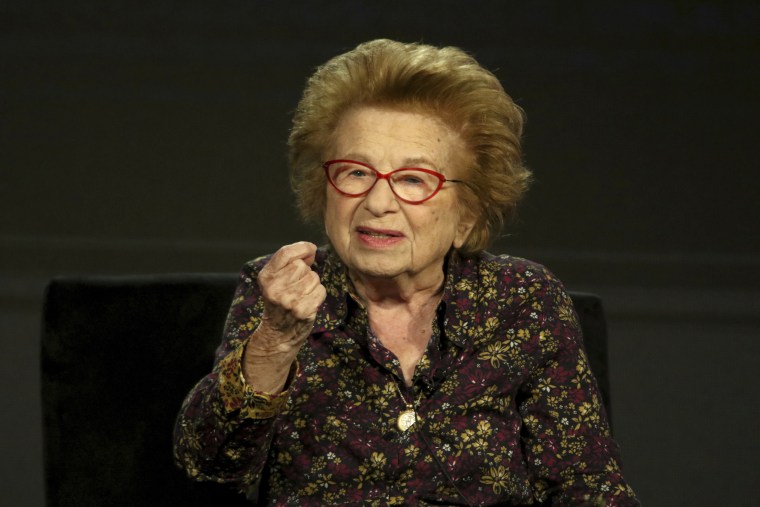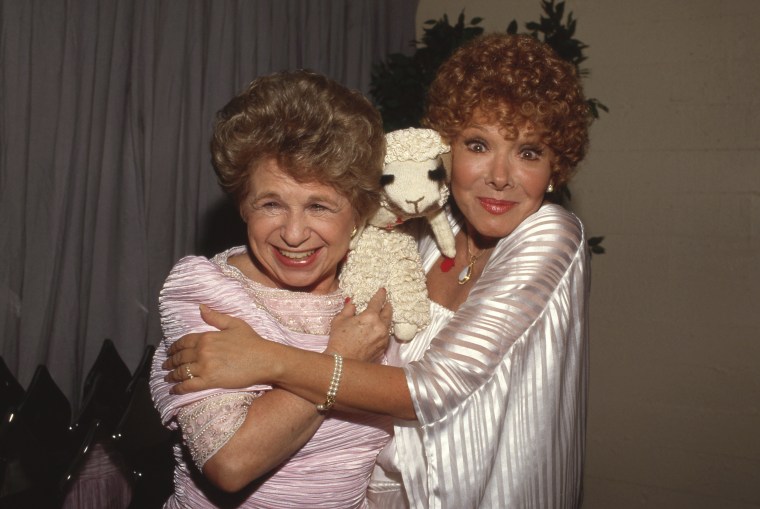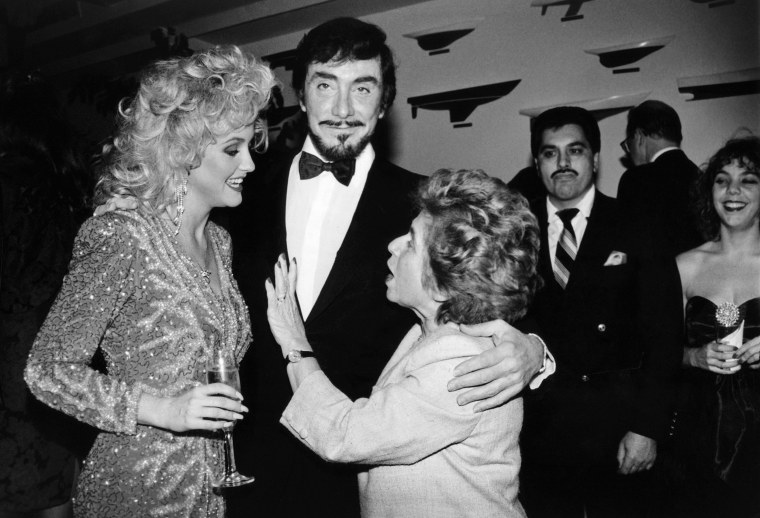Dr. Ruth Westheimer, the Holocaust orphan who rose to become one of the most famous sex therapists in America, a 4-foot-7 celebrity with a big smile and a penchant for tackling the most taboo of subjects with blunt honesty and matronly humor, died Friday at her New York City home, according to her publicist Pierre Lehu.
She died just over a month after her 96th birthday.
“The children of Dr. Ruth K. Westheimer are sad to announce the passing of their mother, the internationally-celebrated sex therapist, author, talk show host, professor, and orphan of the Holocaust,” her family said in a statement Saturday.

The family will hold a private funeral, Lehu said.
As a 50-something psychiatrist, she found sudden fame on radio, television and in bookstores during the 1980s, fueled by a simple formula: Talking honestly in public about intimate subjects that few others dared to utter even in private.
“I knew that there is a lot of knowledge that is around but doesn’t get to young people,” Westheimer told NBC Nightly News in 2019. “There’s a myth (for example) that women don’t need sex. Nonsense. Of course, they need sex.”

Her cheerful public persona as a celebrity sex therapist belied a painful path to arrive at superstardom. Born Karola Ruth Siegel on June 4, 1928 in Frankfurt, Germany, Westheimer was an only child in a wealthy Orthodox Jewish family. Her father, Julius, was a successful businessman who married her mother, Irma, a helper in the household, after getting her pregnant. By Westheimer’s account, it was an idyllic and protected early childhood.
That would change abruptly with the rise of Hitler and his antisemitic pogroms.
On Nov. 9, 1938, the violence against Jews escalated with Kristallnacht, a rampage across the Jewish neighborhoods of Germany after the assassination of a German diplomat in Paris. The synagogue where the Siegels worshipped was among the temples burned to the ground. A week later, the danger hit even closer to home. Nazi soldiers came to take away Julius Siegel to a labor camp.
“They took my father downstairs and before he went into the truck he turned around and smiled and waved despite the fact that he must have been horrified,” she recalled in the documentary, “Ask Dr. Ruth.”
Worried about their only daughter, the Siegels managed to secure a coveted spot on a kindertransport, a program sending a select group of Jewish children to the safety of a children’s home and orphanage in the Swiss village of Heiden. The plan was to protect Karola until the whole family could emigrate to Palestine or the United States together. Instead, the 10-year-old’s farewell to her mother and paternal grandmother at the train station would mark the last time she would see her family alive.
“My parents actually gave me life twice, once when I was born and once when I was sent to Switzerland,” Westheimer later told NBC Nightly News.
Life at the orphanage was hard: Dr. Ruth wrote in her memoir that the German Jews were forced to do the household chores and take care of the Swiss children. It got even harder when letters from her family stopped arriving in September 1941, a few months after Westheimer’s 13th birthday. She would later discover that is when they were sent to Auschwitz, where they would be murdered.
Once she turned 18, she was no longer eligible to stay at the group home, so she emigrated to Palestine with several other peers from the orphanage, settling in a kibbutz. Warned that fellow Jews would mistrust someone from Germany, she ditched her first name, opting to use her middle one.
“Ruth” was conscripted to be a sniper for the Jewish underground when war broke out after Israel declared its independence in May 1948.
“I was fortunate. I never killed anybody, but I could have if I needed to,” Westheimer told NBC’s “TODAY” show in 2015.
Someone else, however, almost killed her. Just weeks into the war, on her 20th birthday, Siegel was severely injured in a bomb blast that left her feet severely damaged and in danger of amputation. She defied the odds and made a full recovery.
In 1950, Siegel accepted a marriage proposal from an Israeli soldier, David Bar-Heim, and accompanied her new husband to France, where he was accepted into medical school. Taking advantage of the opportunity to study psychology at the Sorbonne school in Paris, Ruth gravitated toward the education that had long been denied to her. But Bar-Heim longed to return to Israel, so the couple divorced.
While in Paris, she started up a passionate relationship with a Frenchman named Dan Bommer, which resulted in a pregnancy. As was the norm at the time, the pair married for the benefit of their child. Receiving a restitution check from the West German government for education disrupted by the Holocaust, the couple used the 5,000 marks to emigrate to New York City.
Crossing the Atlantic didn’t save her second marriage, and another divorce left Ruth as a single mother after the birth of her daughter, Miriam. Working as a housemaid for $1 an hour and teaching herself English through romance novels, Westheimer continued her education at the New School and graduated with a master’s in sociology.
During a ski trip with friends, she met Manfred Westheimer, a 6-foot-tall engineer who would become her next husband. The third time would prove a charm: The couple remained together for nearly 40 years, until Fred’s death from complications of a stroke in 1997. They had a son, Joel.
Working at Planned Parenthood of New York City in East Harlem in the late 60s, Westheimer trained paraprofessionals to be family planning counselors. In the process, she found an affinity for relationship counseling. Enrolling in the Teachers College at Columbia University, she was 42 when she graduated with her doctorate. Her thesis used data from her time at Planned Parenthood following the contraceptive and abortive history of 2,000 women in the days before Roe v. Wade made abortion legal.
Realizing there was a void in family and sex therapy, Westheimer managed to land a berth working with noted Cornell psychiatrist Helen Singer Kaplan, who established the first clinic to treat sexual function in the United States.
When WYNY-FM community manager Betty Elam came around to the Cornell Medical Center looking for a volunteer to help fill radio airtime, Westheimer had established herself as an expert in the field. The NBC-owned radio station needed to meet FCC community broadcast requirements, and Westheimer seemed knowledgeable enough to field questions from listeners for one of those shows. The result would be called “Sexually Speaking.”
“I thought she had the perfect voice to talk about these subjects because she sounded grandmotherly and had the perfect attitude,” Betty Elam Brauner recalled to NBC News 43 years later. “She could say things and people would be shocked, but they wouldn’t be offended by it.
Her station’s upper management was less sure than Elam, especially given the sexually explicit nature of the calls and the potential to run afoul of decency laws in the region. So, they scheduled the pre-taped show for Sunday night at midnight.
Westheimer was also skeptical — at least at first.
“I didn’t think I’d do radio, you can hear my accent,” Westheimer told “TODAY” in 2015. “I thought there should be a program because we have the knowledge and radio had the power of the airwaves.”
People did tune in and listen. Elam said she knew they had a hit on their hands by the volume of fan mail that poured into 30 Rockefeller Plaza, where the show was taped. “Sexually Speaking” quickly went from a 15-minute slot to a one-hour show.
“Her warm, frank, and often funny answers are delivered in an idiosyncratic accent that invites but defies mimicry,” is how The New York Times described the rising radio star at the time.
By 1983, it boasted 250,000 listeners, according to Biography.com; a year later, the show was syndicated nationally.
Westheimer became a darling of television, too. She became a regular guest of Johnny Carson, Arsenio Hall, David Letterman and Phil Donahue. Westheimer eventually headlined her own cable show, “Good Sex!,” which ran on Lifetime. The diminutive star even made the jump to the big screen, co-starring with Gerard Depardieu and Sigourney Weaver in the 1985 French romantic comedy, “One Woman or Two.”

Not everyone, however, was a fan. Conservatives voiced outrage over the subject matter. A local politician tried unsuccessfully to make a citizen arrest during an October 1985 lecture at Oklahoma State University, stopped by school officials before he could physically grab Westheimer, The Oklahoman newspaper reported at the time.
Westheimer used her platform to preach empathy and compassion toward the LGBT community during the early days of the AIDS crisis and is credited with changing mainstream perceptions of the disease and its victims.
“Dr. Ruth took the shame out of sex, by emphasizing love and pleasure in its place, and she had that great giggle,” said Anka Radakovich, who wrote a groundbreaking sex column in Details Magazine. “She influenced a whole new generation of women to pursue the field.”
Westheimer kept working long after her radio show ended in 1990. She authored more than 60 books, lectured across the world, and continued to appear on television in as varied programs as “Quantum Leap,” “Melrose Place” and “The Hollywood Squares.”
The year after she turned 90, Westheimer released a children’s picture book called “Crocodile, You’re Beautiful.” In November 2023, New York Gov. Kathy Hochul appointed Westheimer as the state’s first Ambassador to Loneliness to help address the rise in isolation stemming from the Covid pandemic. She continued to give lectures, and also never stopped delivering answers when fellow New Yorkers approached her on the street.
“Even if they ask me a question that I’ve answered 25,000 times, I took it very seriously,” Westheimer told NBC Nightly News in 2019.
Westheimer is survived by her children, Miriam and Joel, and four grandchildren.





